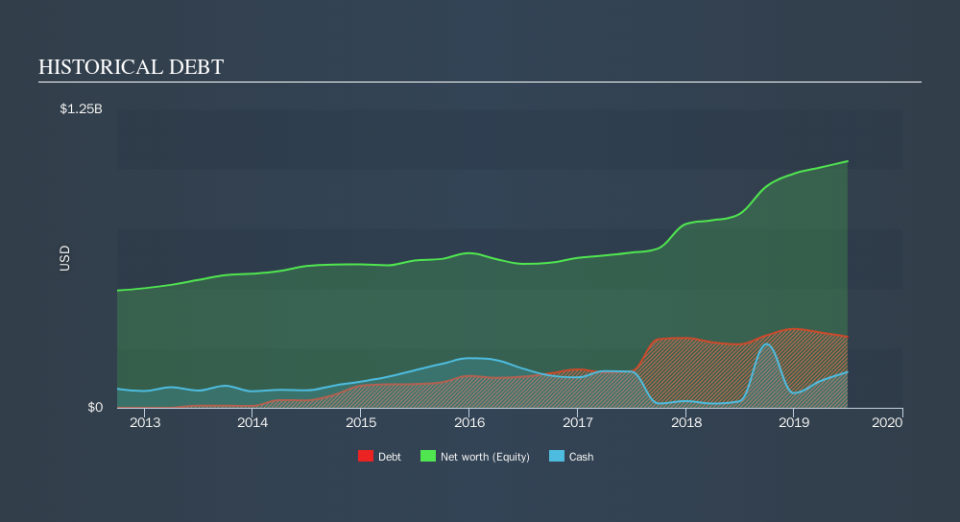Does Hub Group (NASDAQ:HUBG) Have A Healthy Balance Sheet?

David Iben put it well when he said, 'Volatility is not a risk we care about. What we care about is avoiding the permanent loss of capital.' So it might be obvious that you need to consider debt, when you think about how risky any given stock is, because too much debt can sink a company. As with many other companies Hub Group, Inc. (NASDAQ:HUBG) makes use of debt. But is this debt a concern to shareholders?
What Risk Does Debt Bring?
Debt assists a business until the business has trouble paying it off, either with new capital or with free cash flow. In the worst case scenario, a company can go bankrupt if it cannot pay its creditors. However, a more usual (but still expensive) situation is where a company must dilute shareholders at a cheap share price simply to get debt under control. Of course, plenty of companies use debt to fund growth, without any negative consequences. When we examine debt levels, we first consider both cash and debt levels, together.
See our latest analysis for Hub Group
What Is Hub Group's Debt?
The image below, which you can click on for greater detail, shows that at June 2019 Hub Group had debt of US$297.8m, up from US$275.2m in one year. However, it also had US$149.9m in cash, and so its net debt is US$147.9m.
A Look At Hub Group's Liabilities
We can see from the most recent balance sheet that Hub Group had liabilities of US$477.1m falling due within a year, and liabilities of US$420.4m due beyond that. Offsetting this, it had US$149.9m in cash and US$424.4m in receivables that were due within 12 months. So its liabilities total US$323.3m more than the combination of its cash and short-term receivables.
This deficit isn't so bad because Hub Group is worth US$1.57b, and thus could probably raise enough capital to shore up its balance sheet, if the need arose. But it's clear that we should definitely closely examine whether it can manage its debt without dilution.
In order to size up a company's debt relative to its earnings, we calculate its net debt divided by its earnings before interest, tax, depreciation, and amortization (EBITDA) and its earnings before interest and tax (EBIT) divided by its interest expense (its interest cover). This way, we consider both the absolute quantum of the debt, as well as the interest rates paid on it.
Hub Group's net debt is only 0.57 times its EBITDA. And its EBIT covers its interest expense a whopping 18.0 times over. So we're pretty relaxed about its super-conservative use of debt. On top of that, Hub Group grew its EBIT by 74% over the last twelve months, and that growth will make it easier to handle its debt. There's no doubt that we learn most about debt from the balance sheet. But it is future earnings, more than anything, that will determine Hub Group's ability to maintain a healthy balance sheet going forward. So if you're focused on the future you can check out this free report showing analyst profit forecasts.
Finally, a business needs free cash flow to pay off debt; accounting profits just don't cut it. So it's worth checking how much of that EBIT is backed by free cash flow. In the last three years, Hub Group's free cash flow amounted to 35% of its EBIT, less than we'd expect. That's not great, when it comes to paying down debt.
Our View
The good news is that Hub Group's demonstrated ability to cover its interest expense with its EBIT delights us like a fluffy puppy does a toddler. But truth be told we feel its conversion of EBIT to free cash flow does undermine this impression a bit. When we consider the range of factors above, it looks like Hub Group is pretty sensible with its use of debt. While that brings some risk, it can also enhance returns for shareholders. Over time, share prices tend to follow earnings per share, so if you're interested in Hub Group, you may well want to click here to check an interactive graph of its earnings per share history.
At the end of the day, it's often better to focus on companies that are free from net debt. You can access our special list of such companies (all with a track record of profit growth). It's free.
We aim to bring you long-term focused research analysis driven by fundamental data. Note that our analysis may not factor in the latest price-sensitive company announcements or qualitative material.
If you spot an error that warrants correction, please contact the editor at editorial-team@simplywallst.com. This article by Simply Wall St is general in nature. It does not constitute a recommendation to buy or sell any stock, and does not take account of your objectives, or your financial situation. Simply Wall St has no position in the stocks mentioned. Thank you for reading.

